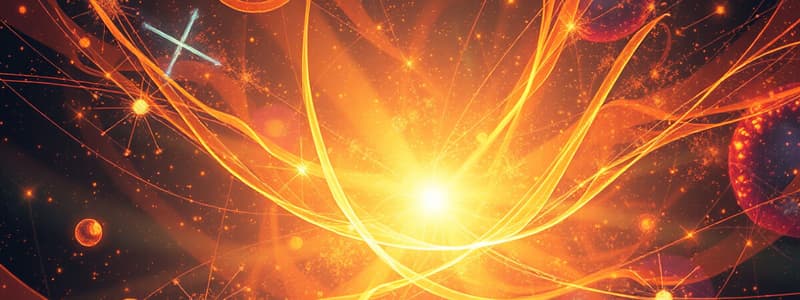Podcast
Questions and Answers
What characteristic allows solids to maintain their shape?
What characteristic allows solids to maintain their shape?
- Particles are loosely packed.
- Particles are tightly packed in a fixed arrangement. (correct)
- Particles move randomly at high speeds.
- Particles have strong intermolecular forces that allow flow.
Which type of change involves the formation of new substances with different properties?
Which type of change involves the formation of new substances with different properties?
- Phase change
- Chemical change (correct)
- Thermal change
- Physical change
Which of the following accurately describes the state of matter known as a gas?
Which of the following accurately describes the state of matter known as a gas?
- Particles are closely packed and vibrate in place.
- Has neither a definite shape nor volume. (correct)
- Has a definite volume but no definite shape.
- Has a definite shape and volume.
Which of the following is an example of a physical change?
Which of the following is an example of a physical change?
What happens to the molecular structure during a physical change?
What happens to the molecular structure during a physical change?
What defines matter in scientific terms?
What defines matter in scientific terms?
Which of the following processes is an example of a chemical change?
Which of the following processes is an example of a chemical change?
How do liquids differ from gases in terms of particle arrangement?
How do liquids differ from gases in terms of particle arrangement?
Flashcards are hidden until you start studying
Study Notes
States of Matter
- Matter exists in three primary states: solid, liquid, and gas, distinguished by particle arrangement and behavior.
Solids
- Solids have both a definite shape and volume.
- Particles in solids are tightly packed in a fixed, orderly arrangement, maintaining their shape irrespective of external containers.
Liquids
- Liquids possess a definite volume but lack a definite shape, allowing them to flow and adapt to their containers.
- Particles in liquids are less tightly packed compared to solids, enabling them to pour and spread while retaining a constant volume.
Gases
- Gases have neither a definite shape nor a definite volume.
- Particles in gases move freely at high speeds and are widely spaced, leading to the ability of gases to expand and fill their containers.
- Gases adjust their shape and volume based on available space.
Matter Definition
- Matter is defined as anything that has mass and occupies space.
Changes in Matter
- Changes in matter can be categorized into two main types: physical changes and chemical changes.
Physical Changes
- Physical changes alter the form or appearance of a substance without changing its chemical identity.
- Examples include:
- Boiling water (liquid to gas)
- Evaporating alcohol
- Sanding a tabletop
- Grinding grain
- Ironing a shirt
- Dissolving sugar in water
- In physical changes, the molecular structure remains unchanged despite changes in state, shape, or size.
Chemical Changes
- Chemical changes result in the formation of one or more new substances with different chemical properties.
- These changes involve breaking or forming chemical bonds, altering molecular structures.
- Examples include:
- Cooking an egg (denaturing proteins)
- Burning gasoline
- Decomposing water into hydrogen and oxygen
- Fermentation of fruit juice
- Rusting of a tin can
- Chemical changes are typically irreversible under normal conditions, leading to new substances with distinct properties.
Importance of Understanding Changes
- Distinguishing between physical and chemical changes is fundamental in chemistry.
- Physical changes are generally reversible and do not create new substances, while chemical changes result in permanent alterations to the original materials.
Studying That Suits You
Use AI to generate personalized quizzes and flashcards to suit your learning preferences.




